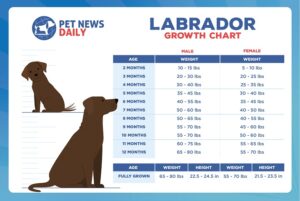In this article, we learn about the Labrador Retriever’s ideal weight. Finding the ideal weight for your Labrador Retriever is crucial for their overall health and well-being. so let me know about the labrador’s ideal weight
The ideal weight for a Labrador Retriever typically ranges between 55 to 80 pounds for males and 50 to 70 pounds for females. However, factors such as age, activity level, and genetics should be considered when determining the ideal weight for your dog. Regular exercise and a balanced diet are essential for maintaining your Labrador’s optimal weight and overall health.
for further information, we know more.
Labrador retriever ideal weight
female Labs should weigh between 55 and 70 pounds, while male Labs should weigh between 65 and 80 pounds

Labrador retriever ideal weight
This are some important information about Labrador retriever ideal weight.
Exploring the Optimal Weight for Labrador Retrievers
At our establishment, we understand the paramount importance of maintaining the ideal weight for Labrador Retrievers. These loyal and affectionate companions deserve the utmost care and attention to ensure their health and well-being. In this comprehensive guide, we delve into the intricacies of determining and managing the ideal weight for Labrador Retrievers.
Understanding Labrador Retriever Body Types
Labrador Retrievers are renowned for their robust build and athletic physique. However, variations exist among individuals, with some displaying a more slender frame while others exhibit a stockier build. Understanding your Labrador’s unique body type is essential in determining their ideal weight.

Factors Influencing Ideal Weight
Factors influencing the ideal weight of a Labrador Retriever include:
-
Age:
- Puppies require different nutrition and feeding schedules than adult dogs to support growth and development.
-
Activity Level:
- More active dogs may require higher caloric intake to maintain muscle mass and energy levels.
-
Genetics:
- Some Labradors may have a genetic predisposition to being larger or smaller than average.
-
Health Status:
- Underlying health conditions or medical issues can affect a dog’s weight and nutritional needs.
-
Spaying/Neutering:
- This can impact metabolism and affect weight gain or loss in Labradors.
-
Body Composition:
- Muscle mass versus fat mass can influence overall weight and body condition score.
Determining the Ideal Weight
Determining the ideal weight of a Labrador Retriever involves several considerations:
-
Breed Standards:
- Referencing breed standards set by kennel clubs can provide a general guideline for the ideal weight range.
-
Body Condition Score:
- Evaluating the dog’s body condition using a standardized scoring system helps assess if they are underweight, overweight, or at an ideal weight.
-
Veterinarian Consultation:
- Consulting with a veterinarian can offer personalized recommendations based on the individual dog’s age, health status, and activity level.
-
Weight History:
- Monitoring the dog’s weight over time and comparing it to previous records can help track changes and adjust feeding and exercise accordingly.
-
Adjustments:
- Making adjustments to the dog’s diet and exercise regimen as needed to achieve and maintain an ideal body condition and weight.
Monitoring Your Labrador’s Weight
Monitoring your Labrador’s weight is essential for their health and well-being. Here are some points to consider:
-
Regular Weigh-Ins:
- Weigh your Labrador regularly using a reliable scale to track their weight over time.
-
Body Condition Scoring:
- Learn how to assess your dog’s body condition using a standardized scoring system to ensure they are at an ideal weight.
-
Dietary Adjustments:
- Make necessary adjustments to your Labrador’s diet based on their weight changes, activity level, and age.
-
Exercise Routine:
- Maintain a consistent exercise routine to help your Labrador stay active and manage their weight effectively.
-
Veterinary Check-Ups:
- Schedule regular check-ups with your veterinarian to monitor your Labrador’s weight and overall health, and to address any concerns or questions you may have.
Establishing a Balanced Diet
Establishing a balanced diet for your Labrador Retriever is crucial for their health and well-being. Here are some points to consider:
-
Nutritional Requirements:
- Understand the nutritional needs of Labradors, including protein, carbohydrates, fats, vitamins, and minerals.
-
High-Quality Food:
- Choose a high-quality dog food that is specifically formulated for large breeds or active dogs, and ensure it meets the nutritional standards set by reputable organizations.
-
Portion Control:
- Measure your Labrador’s food portions according to their age, weight, and activity level to prevent overfeeding or underfeeding.
-
Avoid Table Scraps:
- Refrain from feeding your Labrador table scraps or human foods, as these can be high in calories and unhealthy for dogs.
-
Fresh Water:
- Provide fresh, clean water at all times to keep your Labrador hydrated and support their overall health.
-
Regular Feeding Schedule:
- Establish a consistent feeding schedule with two to three meals per day, avoiding free feeding to regulate your dog’s calorie intake.
-
Treats in Moderation:
- Limit treats and snacks to avoid excessive calorie intake, and opt for healthy, low-calorie options like fruits or vegetables.
-
Monitor Weight and Adjust:
- Regularly monitor your Labrador’s weight and body condition, and adjust their diet as needed to maintain an ideal weight and overall health.
A balanced diet plays a pivotal role in maintaining an ideal weight for Labrador Retrievers. Opt for high-quality dog food formulated for their age, size, and activity level, and avoid overfeeding or relying on table scraps to prevent unnecessary weight gain.
Tips for Weight Management
Here are some tips for weight management in Labrador Retrievers:
-
Regular Exercise:
- Ensure your Labrador gets daily exercise appropriate for their age and activity level, such as walks, runs, or playtime.
-
Portion Control:
- Measure your dog’s food portions carefully and avoid overfeeding by following feeding guidelines provided by your veterinarian or pet food manufacturer.
-
Healthy Treats:
- Offer low-calorie treats or substitute treats with praise or toys to avoid excessive calorie intake.
-
Avoid Table Scraps:
- Discourage feeding table scraps or high-calorie human foods, as these can contribute to weight gain.
-
Monitor Body Condition:
- Regularly assess your Labrador’s body condition score to track weight changes and adjust their diet or exercise routine accordingly.
-
Veterinary Check-Ups:
- Schedule regular check-ups with your veterinarian to monitor your dog’s weight and overall health, and to discuss any concerns or questions you may have about weight management.
-
Weight-Loss Diet:
- If your Labrador is overweight, work with your veterinarian to develop a weight-loss plan tailored to their needs, which may include a prescription weight-loss diet and regular monitoring.
-
Be Patient:
- Weight management takes time and consistency, so be patient and persistent in implementing healthy habits for your Labrador’s well-being
Celebrating Your Labrador’s Health and Vitality
By prioritizing their health and well-being through proper nutrition, regular exercise, and attentive care, you’re ensuring that your Labrador Retriever enjoys a long, happy, and fulfilling life by your side.

Conclusion
In conclusion, understanding and maintaining the ideal weight for your Labrador Retriever is crucial for their overall health and well-being. By considering factors such as age, gender, body type, and activity level, along with implementing a balanced diet and regular exercise regimen, you can ensure that your beloved companion enjoys a healthy and fulfilling life.
Remember to consult with your veterinarian for personalized guidance and monitor your Labrador’s weight regularly to detect any changes or concerns early on.
With proper care and attention, you can help your Labrador Retriever thrive and continue to be the cherished member of your family that they are.

